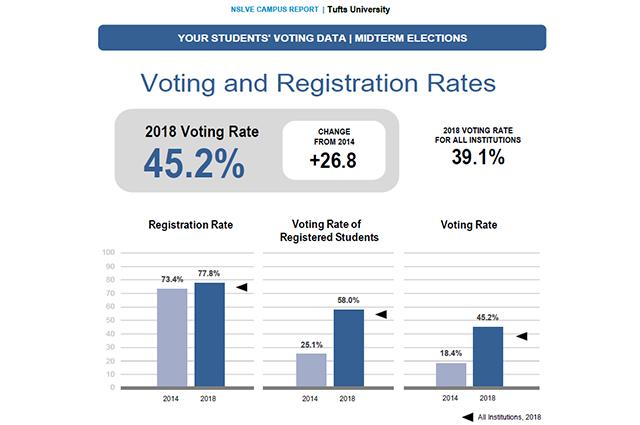45% of Tufts Students Voted in the 2018 Midterm Elections

Youth voting surged in the 2018 midterms all across the country, and the Tufts campus was no exception. Data from the National Study of Learning, Voting, and Engagement (NSLVE) shows that 45.2% of Tufts students voted in 2018, more than doubling the 18.4% turnout rate from the previous midterms, and eclipsing the national average of 39.1% in 2018.
NSLVE conducted by Tisch College's Institute for Democracy & Higher Education, is the nation's only objective measure of college student voting. Unlike other studies which rely on surveys or other forms of self-reporting to measure voting rates, NSLVE matches deidentified student enrollment data with voter file data to produce an accurate assessment of voting by college students.
Read the full Tufts voting report here.
The impressive increase in Tufts' students rate of electoral participation is a testament to the work of myriad students, faculty, staff, and organizations that partnered to facilitate voter registration, to help students cast absentee ballots or get to the polls on Election Day, and to make our university community a politically informed and engaged campus. Chief among these organizations is JumboVote, a student-led voter engagement initiative supported by Tisch College which helped more than 1,000 members of the Tufts community with their voting registration, held numerous educational events, and even drove students to their voting location last November.
"I am thrilled to see the significant increase in undergraduate voting," said Matthew Tolbert, A21, who co-chairs JumboVote. "Of course, there is a lot of work to be done. We are eager to expand our support for students voting absentee, as well as groups we now know voted at lower rates than their peers. Ultimately, our work is about cultivating a campus culture of civic and democratic engagement, which goes beyond voting. Over the next year, JumboVote will be expanding to better support the Tufts community both on Election Day and beyond," he added.
Other significant data from the Tufts voting report include:
- 78% of Tufts students registered to vote, and 58% of those who registered cast a ballot—both higher rates than in 2014.
- As is the case nationally, female students voted at a higher rate than men: 43% vs. 35%
- Remarkably, the voter turnout of students ages 18-21 (42%) was higher than for students ages 22-49, bucking the historical trend of older citizens voting at higher rates and highlighting the remarkable outreach and engagement work of Tufts undergraduates.
- Turnout was highest among undergraduates than among graduate students, and highest among first-year students.
"I'm proud our voting rates increased dramatically, and am really inspired by the fact that first-years had higher voting rates than sophomores and upper-level students; I think this is proof that students are being engaged and are engaging their peers right when they arrive at the university," said Peter de Guzman, A18, who oversaw JumboVote during the 2018 election cycle as Tisch College's Student Outreach Coordinator and now serves as a Research Program Coordinator. "I think that JumboVote has built student capacity for engaging their peers and will continue this effort as they work to close equity gaps in voting at Tufts."